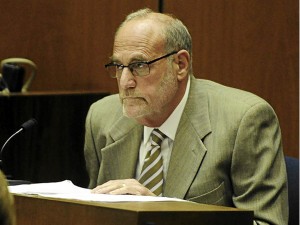LOS ANGELES — Michael Jackson feared he would not be able to perform a series of comeback shows, and begged for something stronger than sleeping pills two months before his death, a court heard Monday.

FORMER JACKSON DOCTOR TESTIFIES. Dr. Allan Metzger, Michael Jackson's former physician, takes the witness stand during the Dr. Conrad Murray trial in Los Angeles Superior Court in Los Angeles, California, Oct. 24, 2011. Murray has pleaded not guilty and faces four years in prison and the loss of his medical licenses if convicted of involuntary manslaughter in Michael Jackson's death. AFP
The testimony came as lawyers for Jackson’s doctor Conrad Murray launched a desperate counterattack, after four weeks of prosecution witnesses heavily implicating the medic in the King of Pop’s 2009 death.
“He spoke to me about this excitement and his fear about the tour,” said Dr. Allan Metzger, referring to the planned series of 50 “This is It” concerts at London’s O2 Arena.
“His fear was that it was a big obligation,” said Metzger, recalling how he had treated Jackson for insomnia and other health woes for years when he was summoned to the singer’s LA mansion on April 18, 2009.
The defense has tried to portray Jackson as a desperate drug addict who could have taken his own life by inadvertently giving himself an overdose of the anesthetic propofol on June 25, 2009.
Metzger said 50-year-old singer begged him to prescribe something he could take intravenously to help him sleep.
“He used the word ‘juice’ … I don’t think he mentioned the word of a specific sleep medication,” said Metzger.
“He did not believe any oral medicine would be helpful,” he added, insisting that he never gave him any intravenous drugs.
Metzger was among the first witnesses to take the stand for Murray’s defense, which faces an uphill task to get the medic off the hook after the prosecution rested its case Monday.
The defense is expected to call some 15 witnesses in all, including medical experts, character witnesses and police, to rebut the charge against Murray, but reports suggest the case could go to the jury by the end of the week.
Over the last four weeks prosecution witnesses have given a litany of evidence suggesting Murray, 58, administered a deadly cocktail of drugs to help the King of Pop sleep, and abandoned him at the vital moment.
The Grenada-born medic, who has sat grim-faced throughout proceedings, faces four years in jail if found guilty by a seven-man, five-woman jury at the long-awaited trial.
Jackson died of “acute propofol intoxication” after Murray spent the night unsuccessfully trying to get him to sleep at the star’s rented mansion in the plush Holmby Hills district of Los Angeles.
The forensic toxicology report two years ago also noted the anti-anxiety drug lorazepam was in the singer’s system. Another defense theory is that a fatal cocktail was produced when Jackson took some extra lorazepam.
DROP OF EVDENCE. Defense attorney Ed Chernoff, right, holds up an intravenous drip during cross examination of propofol expert Dr. Steven Shafer, left, during the Dr. Conrad Murray trial in Los Angeles Superior Court in Los Angeles, California Oct. 24, 2011. Murray has pleaded not guilty and faces four years in prison and the loss of his medical licenses if convicted of involuntary manslaughter in Michael Jackson's death. AP
After the defense launched its case Monday the court also saw grainy black and white footage from security cameras outside the Jackson mansion, as an LA Police Department surveillance expert was questioned before lunch.
The footage showed a convoy of vehicles bringing Jackson home at around 1:00 am on the day of his death, after his latest rehearsal for the ill-fated “This Is It” series of concerts at London’s O2 Arena.
One of the highlights at the five-week trial, which started on September 27, was a recording of an interview Murray gave police two days after Jackson’s death.
In it the doctor recounted how he battled to help Jackson to sleep, from around 1:00 a.m, with a series of IV infusions of sedatives before finally agreeing to give him 25 milligrams of propofol at 10:40 a.m.
He said he left the room for two minutes to go to the bathroom, and returned to find Jackson not breathing. A 911 call was placed at 12:20 p.m. Jackson was eventually pronounced dead at the nearby UCLA Medical Center, at 2:26 p.m.